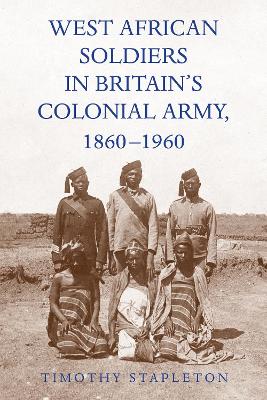Rochester Studies in African History and the Diaspora
2 total works
African Police and Soldiers in Colonial Zimbabwe, 1923-80
by Timothy Stapleton
Published 1 January 2011
Making use of archival documents, period newspapers, and oral interviews, African Police and Soldiers in Colonial Zimbabwe, 1923-80 examines the ambiguous experience of black security personnel, police, and soldiers in white-ruled Southern Rhodesia (now Zimbabwe) from 1923 through independence and majority rule in 1980. Across the continent, European colonial rule could not have been maintained without African participation in the police and army. In Southern Rhodesia, lack of white manpower meant that despite fear of mutiny, blacks played an increasingly prominent role in law enforcement and military operations and from World War II constituted a strong majority within the regular security forces.
Despite danger, Africans volunteered for the police and army during colonial rule for a variety of reasons, including the prestige of wearing a uniform, the possibility of excitement, family traditions, material considerations, and patriotism. As black police and soldiers were called upon to perform more specialized tasks, they acquired greater education and some -- particularly African police -- became part of the emerging westernized African middle class. After retirement, career African police and soldiers often continued to work in the security field, some becoming prominent entrepreneurs or commercial farmers, and generally composed a conservative, loyalist element in African society that the government eventually mobilized to counter the growth of African nationalism. Tim Stapleton here mines rich archival sources to clarify the complicated dynamic and legacy of black military personal who served during colonial rule in present-day Zimbabwe.
Timothy Stapleton is Professor of History at Trent University in Ontario.
Despite danger, Africans volunteered for the police and army during colonial rule for a variety of reasons, including the prestige of wearing a uniform, the possibility of excitement, family traditions, material considerations, and patriotism. As black police and soldiers were called upon to perform more specialized tasks, they acquired greater education and some -- particularly African police -- became part of the emerging westernized African middle class. After retirement, career African police and soldiers often continued to work in the security field, some becoming prominent entrepreneurs or commercial farmers, and generally composed a conservative, loyalist element in African society that the government eventually mobilized to counter the growth of African nationalism. Tim Stapleton here mines rich archival sources to clarify the complicated dynamic and legacy of black military personal who served during colonial rule in present-day Zimbabwe.
Timothy Stapleton is Professor of History at Trent University in Ontario.
West African Soldiers in Britain’s Colonial Army, 1860-1960
by Timothy Stapleton
Published 17 December 2021
Explores the history of Britain's colonial army in West Africa, especially the experiences of ordinary soldiers recruited in the region.
West African Soldiers in Britain's Colonial Army explores the complex and constantly changing experience of West African soldiers under British command in Nigeria, the Gold Coast (now Ghana), Sierra Leone, and the Gambia. Since cost and tropical disease limited the deployment of British metropolitan troops to the region, British colonial rule in West Africa depended heavily on locally recruited soldiers and their families. This force became Britain's largest colonial army in Sub-Saharan Africa.
West African Soldiers looks at the development of this colonial military from the conquest era of the late nineteenth century to decolonization in the 1950s. Rather than describing the many battles fought by this army both regionally and overseas, and informed by the concept of military culture, the book looks at the broad and overlapping themes of identity, culture, daily life, and violence. Chapter topics include the enslaved origins of the force, military identities including the myth of martial races, religious life, visual symbols like uniforms and insignia, health care related to tropical and sexually transmitted diseases, the experience of army wives, disciplinary flogging, mutiny, day-to-day violence committed by troops, and the employment of former soldiers by the colonial state. Based on archival research in five countries, the book derives inspiration from previous work on ordinary African soldiers in the British and German colonies of East Africa and in French West Africa.
West African Soldiers in Britain's Colonial Army explores the complex and constantly changing experience of West African soldiers under British command in Nigeria, the Gold Coast (now Ghana), Sierra Leone, and the Gambia. Since cost and tropical disease limited the deployment of British metropolitan troops to the region, British colonial rule in West Africa depended heavily on locally recruited soldiers and their families. This force became Britain's largest colonial army in Sub-Saharan Africa.
West African Soldiers looks at the development of this colonial military from the conquest era of the late nineteenth century to decolonization in the 1950s. Rather than describing the many battles fought by this army both regionally and overseas, and informed by the concept of military culture, the book looks at the broad and overlapping themes of identity, culture, daily life, and violence. Chapter topics include the enslaved origins of the force, military identities including the myth of martial races, religious life, visual symbols like uniforms and insignia, health care related to tropical and sexually transmitted diseases, the experience of army wives, disciplinary flogging, mutiny, day-to-day violence committed by troops, and the employment of former soldiers by the colonial state. Based on archival research in five countries, the book derives inspiration from previous work on ordinary African soldiers in the British and German colonies of East Africa and in French West Africa.

